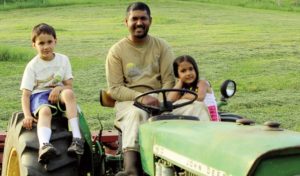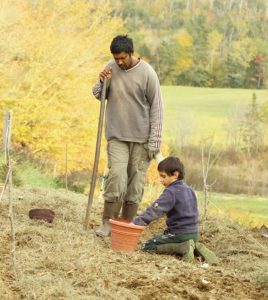Pumpkin Vine Family Farm a family affair
by Mary Grow
Kelly Payson-Roopchand has found her place in life.
She and her husband Anil live on Pumpkin Vine Family Farm on Hewett Road, in Somerville, with their two children, numerous goats and ducks, two pigs, two Jersey cows, two cats, a boisterous young dog, and assorted wildlife, from the barn swallows nesting in the old barn to the frogs, turtles, beaver and occasional moose in the brook at the foot of the nearer field.

Anil with the children Kieran, left, and Sarita. Photos courtesy Kelly Payson-Roopchand
The place has been farmed since the early 1800s. The barn was probably built in the 1820s, with an addition in the 1920s; Kelly and Anil had an expert replace worn-out sections in 2010. Francis Kennedy built the stone bridge across the brook in 1870 so his sheep could reach the far pasture.
The original part of the house also dates from the 1820s. It stands just below the crest of a hill with a view to the southeast, sheltered by the hilltop and the barn from the cold winter wind. “We’re so lucky to be here,” Kelly says. “We’re just the present caretakers; we want to share.”
And share they do. Pumpkin Vine Family Farm welcomes visitors Sundays from 10 a.m. to 4 p.m., and the second summer of Farm Camp for children will run for two weeks in July and August. Sunday guests can tour the property and meet the animals, often guided by Kieran, who’ll be eight years old the end of July, and Sarita, who turned six late in March. Sarita shares her birthday with her maternal grandfather, Harold “Smoky” Payson, of China, and with Shirley Hewett, widow of Donald Hewett, the last of the six generations of farmers who owned the property before Kelly and Anil bought it in 2007.
Kieran has other farm assignments, too, helping with milking and haying, but he still has time to enjoy catching frogs and spotting turtles at the brook.

Anil planting garlic with Kieran last fall. Photos courtesy Kelly Payson-Roopchand
In the former garage Don Hewett’s brother Lloyd built just south of the house Kelly and Anil run a Sunday shop, selling their home-made goat cheeses, goat milk and fall vegetables (the goats keep them too busy to tend a summer garden). This spring Benji Knisley and Shaun Keenan from Sand Hill Farm joined them, bringing early vegetables, baked goods and jams and jellies.
Inside the big barn, separated from the hay-strewn wooden floors and wooden pens, are two ultra-modern easy-clean rooms, one for milking the goats and one for making cheese. Goat milk easily picks up flavors from its surroundings, Kelly explained; milking in the barn can give it a sourish taste, milking in a clean room retains its natural sweetness.
Farm Camp started in 2015 with a single session. It was so successful that this year there are two sessions, July 18 to 22 for children from four to six years old and August 8 to 12 for those seven to nine years old. By mid-June the first session was full; there were still two vacancies for older children.
In preparation for Farm Camp, the settlers’ garden of potatoes and grains and the Native American garden with the traditional threesome of squash, beans and corn have been planted for young campers to weed, water and learn from.
The farm is old, but innovations are welcome. Don and Shirley Hewett were delighted to abandon kerosene lanterns and hand pumps when electricity was introduced in the 1940s, and Kelly and Anil have established their web site, pumpkinvinefamilyfarm.com.
Kelly and Anil’s dual mission is to keep Pumpkin Vine Family Farm a working farm and to teach interested people of all ages about their connections to the land.
They came to their lifestyle from academic backgrounds; both hold advanced degrees in agricultural subjects. Both preferred hands-on farming to the desk jobs that normally follow such an education, although, Kelly says, theoretical knowledge is extremely valuable: they know enough about soil science, chemistry, animal genetics and dozens of other topics to prevent many potential problems and solve most that do arise.
They have not chosen a life that will make them rich, nor an easy life. Both hold part-time outside jobs, and both sets of parents have helped financially and physically. Much of their farm equipment is old enough to make Anil’s mechanical skills invaluable.
Especially in spring and summer, farm work begins before sun-up and continues after sunset. Earlier this spring Kelly went to check on a very pregnant goat named Viola at 3 a.m. and decided she’d better not go back to bed; at 5:30 a.m. she played midwife as Violet was born.
Nonetheless, Kelly found time to write a book about Pumpkin Vine Family Farm. Birth, Death and a Tractor: Connecting an Old Farm to a New Family, was published last year by Down East Books. The book was one of three finalists for the John N. Cole award offered by the Maine Writers and Publishers Alliance, and just won third place in the nature category in Foreword Reviews’ national Indiefab competition. Inspired by and including many of the stories Don and Shirley Hewett told, Birth, Death, and a Tractor alternates between historical sketches and Kelly and Anil’s story from the fall of 2009 through the spring of 2010.
“We’re just carrying on the tradition,” Kelly said. “It’s a beautiful place and a beautiful connection; it feels like we’re part of the farm.”
Responsible journalism is hard work!
It is also expensive!
If you enjoy reading The Town Line and the good news we bring you each week, would you consider a donation to help us continue the work we’re doing?
The Town Line is a 501(c)(3) nonprofit private foundation, and all donations are tax deductible under the Internal Revenue Service code.
To help, please visit our online donation page or mail a check payable to The Town Line, PO Box 89, South China, ME 04358. Your contribution is appreciated!


Leave a Reply
Want to join the discussion?Feel free to contribute!